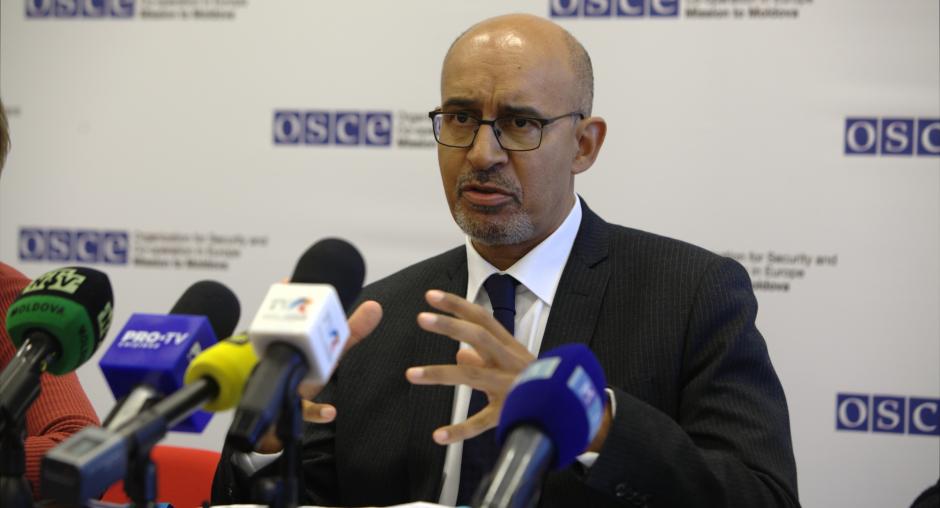OSCE Media Freedom Representative concludes visit to Moldova, encourages authorities to foster free and pluralistic media

CHISINAU, 30 November 2018 – The OSCE Representative on Freedom of the Media Harlem Désir today called on the Moldovan authorities to put more efforts into strengthening media freedom and pluralism in the country as he ended a three-day visit to Moldova.
During his visit, the Representative met with Tudor Ulianovschi, Minister of Foreign Affairs and European Integration; Andrian Candu, President of the Parliament; Dragoş Vicol, Chairperson of the Co-ordinating Council of Audiovisual Activities; and Olga Bordeianu, President of the Teleradio-Moldova National Public Broadcaster. He also met representatives of civil society and the media community.
Désir spoke at the opening of the Media Forum at the invitation of the Press Council of Moldova, the Association of Independent Press, the Independent Journalism Centre and the Association of Electronic Press. He also participated in the award ceremony of the 2018 ADAMI Media Prize for Cultural Diversity in Eastern Europe.
In separate meetings, the Representative met with Andrei Nastase, Chairperson of the Dignity and Truth Platform Party, and Maia Sandu, Chairperson of the Action and Solidarity Party.
“Moldova has engaged in an important and comprehensive process of reforming media-related legislation. I strongly encourage the authorities to use this opportunity to foster an enabling environment for the development of a free and pluralistic media landscape. This includes strengthening the real diversity of the media. More efforts will be needed to effectively limit the concentration of media ownership,” Désir said.
Désir encouraged the authorities to examine the challenges for media freedom and pluralism posed by the high degree of concentration of media ownership, which is detrimental to the diversity of voices and the development of independent media. Fair competition rules on the media market are needed, including for financing and access to commercial advertisement. “My Office stands ready to assist the country in providing expert recommendations and advice,” he said.
In his talks with the authorities and other interlocutors, the Representative discussed the new Code of Audio-visual Media Services recently adopted by Parliament. Regarding the legislative amendments on access to information, and the draft law on personal data protection, Désir took note of concerns of investigative journalists regarding provisions that may introduce undue restrictions on the legitimate work of journalists who report on corruption issues.
"Access to information and reporting on issues of public interest should not be obstructed by administrative obstacles that may serve to shield individuals, including public authorities, from legitimate investigative reporting," Désir said.
Earlier in June 2018, the Representative presented a legal review of the draft Code of Audio-visual Media Services: www.osce.org/representative-on-freedom-of-media/385206
“The media need legal certainty and compliance of new laws and regulations with international media freedom standards, established in consultation with all stakeholders,” Désir said. “It would be of the utmost importance to ensure the effective implementation of the legislation supporting media pluralism and access to information.”
The Representative further encouraged the authorities to refrain from undue interference in media activities in their efforts aimed at countering disinformation and propaganda, and recalled the need to ensure the free flow of information in compliance with OSCE commitments.
"The best answer to propaganda and disinformation is quality journalism, journalists working with high professional standards and the development of independent media. In the era of fake news and disinformation, journalists have a very high level of responsibility. We see how smear campaigns and hate speech are disseminated; this is an issue of very strong concern, as it has an impact on the functioning of democracy. That’s why we need more than ever to support independent journalism, the quality of information and media literacy.”
During his visit, Désir also underlined the important role of a strong and independent public service media, which should impartially reflect the diversity of opinions and serve as an example for all media outlets by offering quality content. The Representative highlighted the need to enhance the capacity and independence of regulatory authority in the broadcasting field, especially in the context of upcoming elections in Moldova.
